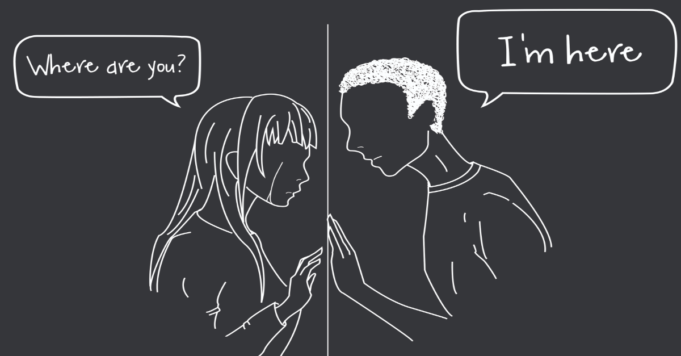We’ve all faced some troubles and situations, or lived through certain circumstances that grew into insecurities as we got older. Which is totally okay, we have all been there. We’ve all also waited for the right partner who is going to wholeheartedly accept our flaws and help us get over that nightmare –aka our insecurity- that has been chasing us forever. But like everything else, there’s a fine line between supporting, accepting and loving your partner with their flaws and actually starting to feel the toxicity leaking into your life because of their insecurity.
For instance: A girl who got cheated on in a previous relationship will always have trust issues towards her current partner. So here comes the dilemma. To which extent shall her partner put up with it, and go out of his ways to make her feel secure and loved. And beyond which extent shall he leave without any sense of guilt that he left because of her ‘insecurities’.
That super fine line that you need to figure out in order to make a decision isn’t easily spotted, that’s why our Relationships Expert, Marwa Rakha, has your back and will tell you more about it.
How Can I spot my partner’s insecurity early on? And how would that help?
In the beginning of a relationship, we all strive to leave a good impression. No one wants to come across as clingy or negative. Even the most careful of us will give off a few cues, and our partner can sense our insecurities.
Likewise, we can sense their fears and lingering demons. We can feel the skeletons that are hiding in the closet. We know … we just know … when something is off.
There is no recipe to follow when trying to dig up the buried bodies of a partner’s insecurities. Use your sixth sense and trust your instincts. If deep down you feel that your partner lacks self-confidence, then he/she does. If you feel that they are jealous but acting cool, believe it. If you feel they are lying, most probably they are.
Some issues are buried deeper than others, and you will only know them as you get to know your partner. The fear of being abandoned, for instance, only surfaces when you hear their stories about their parents and previous relationships. The fear of being cheated upon is one of the issues that does a very good job camouflaging into other things, like jealousy out of love.
Spotting insecurities early on in a relationship only helps you with one thing: to decide to stay or to leave. It is as simple as: Can I handle this? Am I willing to handle this? Is it worth it?
What is smarter or more beneficial to the relationship; ignoring the insecurity like it doesn’t even exit in order to avoid making the insecure partner uncomfortable and hence more insecure? Or acknowledging it and have a serious discussion about it?
If you do sense an area of insecurity or two, do not mention it. Wait, watch, observe, take mental notes. Try to keep track of the incidents that triggered that insecurity, the impact they had on your relationship, when and how your partner returned to normal after the “insecurity attack”, and what your partner had to say to justify his/her behavior at the time.
When you are certain, and fully equipped with evidence and information, choose a time when you and your partner are having an open conversation, a moment of spiritual intimacy, and bring up the topic. For example,
“I noticed that you do not like my friend “Y”, every time he is around, I feel you tend to be quiet and distance yourself. What is it about “Y” that bothers you?”
Do not name the insecurity, do not blame your partner, and do not point fingers. Just bring it up as a feeling or an observation, and drill slowly. If your partner shuts down, leave it there.
Observe more, collect more data and incidents, then bring it up again later. One day, your partner will be ready to open up. Be careful! You are not a therapist! You are not a savior!
There is a difference between the roles of a loving supportive partner and a therapist. Your role is to comfort your partner, and to rationally discuss the validity/invalidity of the issue, and its impact on your relationship.
Healing, treating, and mending a broken person is not your job. It is okay to recommend a therapist, to see one together, or to walk away.
Can someone actually make another person’s insecurity fade? Or at least help not to make it grow worse?
In a relationship, you cannot make someone’s insecurities “fade away”. The best you can do is to avoid triggering them, and to discuss them when they erupt. For example, if your partner has a fear of being abandoned, no matter how many times you promise to stay, how many times you prove to be available, and how many times you choose to stay when anyone else would have left, your partner would still fear the day you leave.
Another example, if someone lacks self-confidence, no matter how many times you reassure him/her that you find them perfect inside out, that you love their hair, face, body, etc., they would feel ugly and uncomfortable in their skin.
The worst part is that his/her actions would actually lead you to leave, would drive you away, would alienate you until you no longer could afford to be in this relationship. That is why recommending a therapist can save the relationship!
What are the red flags that can make a partner walk away with a good conscience, and without feeling like they gave up on their other half?
Walking away from an unhealthy relationship sounds like an easy thing to do, but when a person is involved in the relationship, he/she does not see that it would be wise to leave, especially when they are playing the role of the savior.
Here are a few signs that it is about time to end a relationship with an insecure person – no matter the reason of the insecurities:
- You are always apologizing.
- You are always sorry.
- You are tired, exhausted, and bummed-out.
- You always have some explanation to do.
- Your partner is always crying, whining, and nagging.
- You feel stressed as if you are walking in a minefield.
- Your conversations and outings feel like therapy sessions.
- You are losing your friends because your partner does not like them.



















